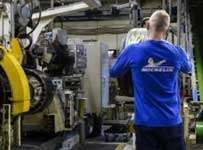Tyre maker Michelin’s Bassens petrochemical site, located about 6 miles from Bordeaux, recently celebrated its 60th anniversary, having been opened since 1964, producing and developing elastomers.
The site, with its 460 employees, plays a strategic role by producing several tens of thousands of tonnes of synthetic rubber per year. It supplies the Michelin Group’s tyre production sites, predominantly in Europe (90%), as well as in the US, Brazil, India, China and Thailand.
The site also works on innovative projects that will be industrialised in the coming years, thereby guaranteeing a promising future for the factory and its employees. Located in the heart of the Bassens port-industrial area since 1964, the site is around six miles away from Bordeaux city centre, on the right bank of the Garonne River. It spans more than 60 ha, and is easily recognizable thanks to its distinctive chimney with its vertical Michelin wording, says the French tyre maker.
As a unique site in Michelin’s industrial universe, Bassens occupies a strategic position within the group, it adds.
Its production of synthetic elastomers is strategic for manufacturing tyres that offer very high-performance levels, reduced rolling resistance and an increased service life, as well as for developing new elastomers, which are the fruit of research and which will be used to make the tyres of tomorrow, says Michelin.
The Bassens site’s workforce boasts petrochemical and chemical engineering expertise, to support the Michelin Group’s projects worldwide in the fields of natural rubber, synthetic rubber and composites.
Launched on the site in 2018, a pilot production plant for bio-based butadiene (BioButterfly) was inaugurated in January 2024. Synthetic rubber is currently produced using petroleum-based products, whose main raw material is butadiene.
The BioButterfly project aims to develop sustainable alternatives to this raw material in order to drastically reduce the carbon footprint of tire design.
Today, the site is also working, in the mid-and long-term, on the development of new, innovative elastomers.
These projects are consistent with Michelin’s objective to produce tires containing 100% recycled, renewable and bio-based materials by 2050.
Environmental challenges are also central concerns for the Bassens site, which, just like the group, is reducing its environmental footprint each year. The site’s Seveso ranking requires regular investment to guarantee unfailing industrial safety standards – one of the group’s priorities.

